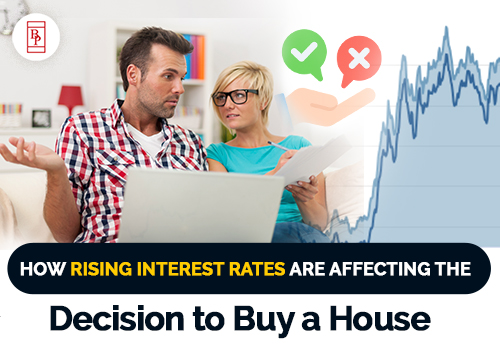How Rising Interest Rates Are Affecting the Decision to Buy a House
Saturday, February 8, 2025

 The real estate market is undergoing significant transformations due to various economic and policy-driven factors. One of the most critical influences today is the rise in interest rates, which directly affects the affordability of homeownership. For individuals contemplating how to buy a house, understanding the impact of these rates is essential to making informed decisions. The Bellevue real estate market, like many others, is experiencing shifts in buyer demand and pricing dynamics as a result. This article explores the ways rising interest rates influence affordability, buyer behavior, and the broader housing market while providing strategies to help prospective homeowners navigate the challenges.
The real estate market is undergoing significant transformations due to various economic and policy-driven factors. One of the most critical influences today is the rise in interest rates, which directly affects the affordability of homeownership. For individuals contemplating how to buy a house, understanding the impact of these rates is essential to making informed decisions. The Bellevue real estate market, like many others, is experiencing shifts in buyer demand and pricing dynamics as a result. This article explores the ways rising interest rates influence affordability, buyer behavior, and the broader housing market while providing strategies to help prospective homeowners navigate the challenges.
The Significance of Interest Rates in the Housing Market
Interest rates are a crucial component of the housing market because they dictate mortgage rates—the cost of borrowing money to buy a house. When interest rates are low, mortgages become more affordable, encouraging buyers to enter the market. Conversely, rising interest rates increase borrowing costs, making monthly payments higher and homeownership less attainable for many.
How Mortgage Rates Are Affected by Rising Interest Rates
Interest rates have a big impact on whether people can afford to buy a home. They determine the cost of borrowing money, which directly affects mortgage payments. When interest rates rise, monthly mortgage payments increase, making homeownership more expensive. Conversely, lower rates make buying a home more affordable.
For example, a $300,000 mortgage at a 3% interest rate has a monthly payment of about $1,265 (excluding taxes and insurance). If the interest rate increases to 6%, the monthly payment rises to approximately $1,799—a significant jump for most households.
Rising Interest Rates and Home Buyer Behavior
Affordability Challenges
The most immediate consequence of rising interest rates is the erosion of affordability. For individuals weighing the decision to buy a house, the higher monthly costs can make what once seemed feasible suddenly feel unattainable. Homes that were comfortably within budget at a lower interest rate might now require significant lifestyle adjustments or be ruled out altogether.
The Impact on First-Time Buyers
First-time homebuyers are often the most vulnerable to changes in interest rates because they typically lack the financial flexibility that comes from owning property or having significant equity. Rising interest rates can make the already daunting process of buying a home even more challenging, as these buyers are more likely to face tighter budget constraints and limited borrowing power. When rates increase, monthly mortgage payments rise, potentially pricing first-time buyers out of the market altogether. This can lead to significant shifts in their homebuying goals, with many forced to downsize their aspirations or settle for homes in less desirable locations. For some, the dream of homeownership may be delayed as they work to save more for a down payment or improve their credit score to qualify for better loan terms. Others might find themselves reevaluating their priorities, debating whether buying a home is feasible or financially wise in the current economic climate. The focus often shifts from planning how to buy a house to grappling with whether they can afford to buy at all. This uncertainty can create a sense of frustration and discouragement, particularly for younger buyers eager to establish roots or invest in their future.
Delayed Purchases
Higher interest rates can also lead potential buyers to postpone their plans. With the hope that rates might stabilize or decline in the future, some individuals opt to save for a larger down payment or wait for a more favorable market. This waiting game, while logical, can be emotionally taxing, especially for those eager to achieve homeownership.
Broader Impacts on the Housing Market
The ripple effects of rising interest rates extend beyond individual buyers and into the wider housing market.
Slower Home Sales
A common consequence of rising interest rates is a decline in home sales. As fewer buyers are willing or able to enter the market, demand diminishes, leading to a slowdown in transactions. Sellers who previously benefited from multiple offers and bidding wars may now find it challenging to attract buyers.
Shifting Market Dynamics
The shift in buyer behavior also forces sellers to adjust their strategies. Homes that once sold quickly may linger on the market for weeks or months. Sellers may respond by reducing asking prices or offering incentives, such as covering closing costs or including appliances, to entice buyers. However, for many buyers, these discounts may not be enough to counterbalance the higher monthly costs caused by elevated interest rates.
Strategies for Buying a Home in a High-Interest Environment
While rising interest rates present challenges, they do not render homeownership impossible. By adopting specific strategies, prospective buyers can still achieve their goal of buying a home.
1. Compare Mortgage Offers
Mortgage rates vary by lender, so it’s crucial to shop around. Securing a lower rate, even by a fraction of a percent, can translate into significant savings over the life of a loan. Working with a trusted mortgage broker or financial advisor can help identify the best options.
2. Explore Adjustable-Rate Mortgages (ARMs)
Adjustable-rate mortgages often start with a lower interest rate compared to fixed-rate loans. For buyers who plan to sell or refinance before the rate adjusts, this option can provide short-term savings. However, it’s important to understand the risks, as future rate adjustments could increase monthly payments.
3. Increase Your Down Payment
A larger down payment reduces the total amount borrowed, which lowers monthly payments and makes homeownership more affordable despite higher interest rates. Saving for a 20% down payment not only decreases loan amounts but also eliminates the need for private mortgage insurance (PMI).
4. Look for Smaller or More Affordable Homes
Adjusting expectations is another practical approach. Buyers can explore smaller homes, consider fixer-uppers, or look in less competitive areas to find properties within their budget. By prioritizing needs over wants, buyers can still achieve their goal of owning a home.
5. Work with a Knowledgeable Real Estate Agent
An experienced real estate agent can provide valuable insights into how to buy a house in today’s market. They can identify opportunities, negotiate favorable terms, and help buyers navigate the complexities of purchasing in a high-interest-rate environment.
The Psychological Toll of Rising Interest Rates on Buyers
The financial implications of rising interest rates are clear, but the emotional impact on buyers is equally significant. Homeownership often represents stability, security, and success, and the inability to achieve this goal can be disheartening.
Managing Expectations
For many, buying a home may require adjusting expectations. This could involve settling for a starter home instead of a dream home, considering different neighborhoods, or delaying non-essential renovations. These adjustments, while difficult, can keep the goal of homeownership within reach.
Empowering Buyers Through Education
Understanding the housing market and available options can alleviate some of the stress associated with rising interest rates. By staying informed, buyers can approach the process with confidence and make decisions that align with their long-term financial goals.
The Long-Term Outlook: Is Now the Right Time to Buy?
While current interest rates are higher than the record lows seen in recent years, they are still relatively modest compared to historical peaks. For example, mortgage rates in the 1980s exceeded 18%, making today’s rates seem manageable by comparison.
Market experts anticipate that interest rates may stabilize or decrease in the coming years as inflation is brought under control and economic conditions improve. For buyers, this cyclical nature of the market underscores the importance of patience and preparedness.
Factors to Consider
When deciding whether to buy a house now or wait, consider factors such as personal financial stability, job security, and long-term plans. If buying a home aligns with your goals and budget, the benefits of homeownership—such as building equity and creating a stable living environment—can outweigh the challenges of higher interest rates.
Conclusion
Rising interest rates have undeniably reshaped the housing market and influenced how individuals approach the decision to buy a house. For many, the higher cost of borrowing has created financial and emotional hurdles. However, with careful planning, informed decision-making, and a willingness to adapt, buyers can still navigate these challenges and achieve their homeownership goals. Investing in Bellevue real estate presents both opportunities and challenges in this evolving market, making strategic planning even more crucial for prospective buyers.
Whether you’re a first-time buyer learning how to buy a house or an experienced homeowner considering an upgrade, understanding the market and employing strategic approaches is key. The road to buying a home may be more complex in today’s environment, but with the right tools and mindset, it remains an attainable milestone.




